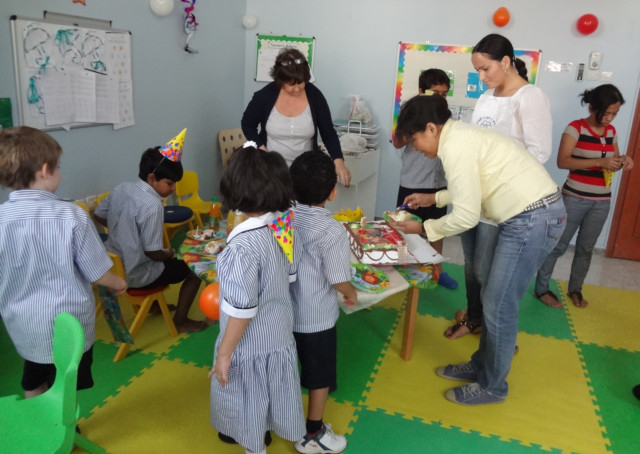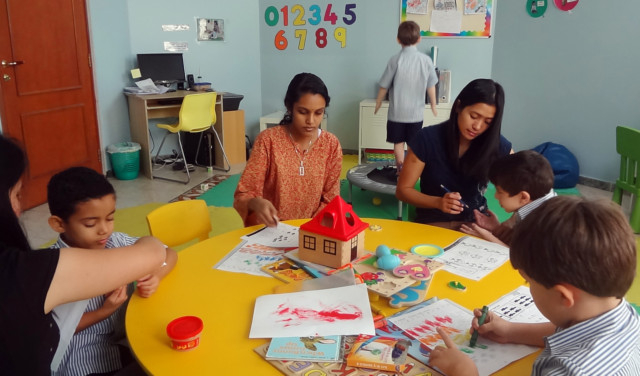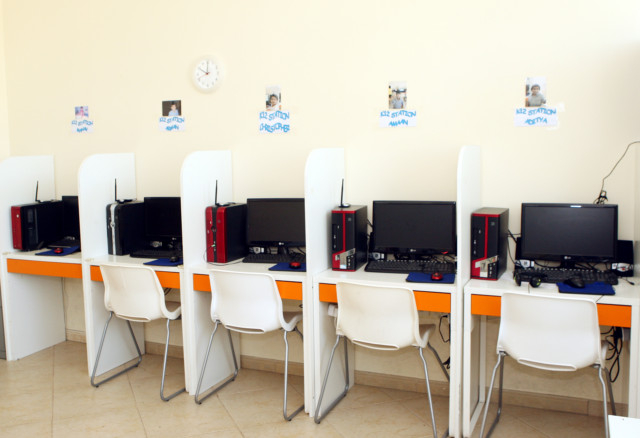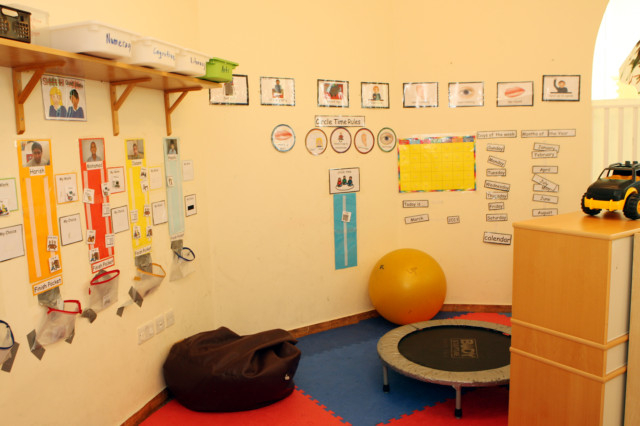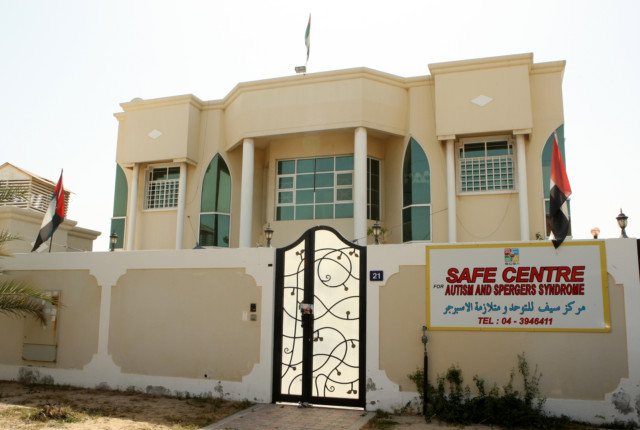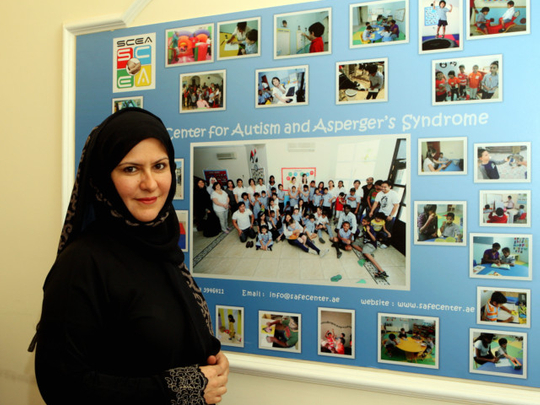
Ahmed Yousef’s birth had been difficult. Doctors had warned his mother of the possible effects of oxygen deprivation. However, Ahmed’s developmental milestones were normal and there was no obvious problem for the first few years. It was when he started school that the issues began to surface. “Teachers said he had ADHD, was very hyper, would never it still and was not able to concentrate,” says Mahbooba Yousef. Right away, she saw that his education was going to be a problem. “He was in the mainstream, but I brought in an ABA (Applied Behaviour Analyst) to work with him,” she says.
This was in 1994 when awareness about special needs, particularly autism, which is what Ahmed had, was low. With proper training, her son could do well, but not as part of the mainstream, the analyst told her.
It was news that made Mahbooba Yousef consider an idea that would not only change her life one more time but also those of many other children like Ahmed. But not just yet. “At that time my hands were full. I had three small children, I also was studying.”
A few other things were waiting to have their impact, meanwhile.
Ahmed was four at the time when the school he was attending informed her that they had no place for him. “So, we took him to UK where my husband was to study for a year,” says Mahbouba. “Ahmed was in a mainstream school there, but they were also working with him one-on-one.” At some point, the school advised her and her husband that their son was better off in a school for children with special needs.
By then she was acutely aware of how a special needs child in a mainstream school could develop unique issues. “The moment other children realise that a child is different, they start bullying him. The child will automatically regress, be angry about the bullying, the name-calling, and that is when behaviour problems start. What is initially an issue with academics will eventually escalate into general behavioural problems. The child will become isolated and withdrawn.”
Meanwhile, the nature of her husband’s job meant that the family moved frequently to different parts of the world. So she had the opportunity to visit special needs schools in each place and study the way they functioned. Though she learned something from each place, it was a summer camp in New York that made a real difference to the lives of Mahbouba and her son.
Ahmed was a part of the two-month long Camp Huntington in 2007. When he returned from the camp, he was a changed boy. “I don’t know what exactly they did – I only know that they had a lot of activities. These kids have a lot of energy – they never get tired. At the camp, they somehow made use of that energy. When he came back, he was more organised, as if he had gained common sense,” she says with a laugh.
The idea that she had been nursing for some time was now tugging at her with more strength. It was time to start her own centre for children with special needs. “From the time I was young, I had wanted to do something for the world, something that will outlast me,” she says. Her experiences with Ahmed and the amazing transformation that the camp brought to their lives showed her the direction in which she needed to move.
Opening the Safe Center for Autism and Asperger’s Syndrome was not easy. “It was a long process, naturally,” says Mahbooba. “A lot of formalities had to be addressed. Then one day, I had the opportunity to talk to His Highness Sheikh Mohammed Bin Rashid Al Maktoum, Prime Minister of UAE and Ruler of Dubai, and ask him for help. Believe me, he opened all doors for me. It was a heart-warming experience.”
With his help, in September 2010, she launched the Safe Center which became functional in a matter of two to three months. At the time of its launch, the Centre had three children supported by four staff. Today, it has 29 salaried staff and one volunteer, an Emarati lady, a friend of Mahbooba. Between the students and the staff, the Center is an amalgam of 28 nationalities. “If you look at a typical classroom, you can see six children of different nationalities here. Our doors should be open to all nationalities, all genders. Like Dubai itself. And there is something good to be learned from everybody,” she adds with a smile.
The volume of work has increased by leaps and bounds and, “Sometimes, my friend and I work through Fridays and holidays to catch up with it,” she says, unable to conceal the pride in her voice. For Mahbouba, her work has no boundaries. In the way she has named her project, Mahbooba achieves twin purposes. ‘Safe Center’ Arabic translation reads ‘Saif’ Center, named after Mahbouba’s youngest son. In English, she calls it ‘Safe’ Center because that is what she aims to provide - a safe environment for children with autism. The Center focuses solely on children with autism because Mahbouba has found that “the needs of a child with autism or Asperger’s Syndrome are different to that of children with other differences.” Children between the ages of 3-12 are accepted at the Center which functions from 8am to 3pm.
The Center currently functions from a villa, and space is one of the biggest constraints it is currently facing. Though the available space has been efficiently used, there is still a dire need for more, as each child needs a separate study space so as not to be distracted by others. The villa’s kitchen has been converted into a dining space, and while it is functional, the space is hardly enough for 41 children, many of who need training even in the mechanics of eating, as well as the staff. This has meant that she has has to draw the line when it comes to admitting new students, a situation she is not too happy about.
Even though the center is a not-for-profit organization, intervention for special needs is inherently expensive – from the rents to the staff salaries, the costs are high. The Emirates Airlines Foundation has been a huge support in Mahbouba’s endeavours. “Because of them, we are able to charge the parents much less than we would have had to, otherwise,” says Mahbooba. The Foundation also provides occasional support in the form of volunteers from among the airline staff, accepted by Mahbouba after careful scrutiny.
Occupational, behavioural, language and speech therapies are provided by professionals, along with play and music therapy, keeping in mind the specific needs of autism. “Play is an important part of a child’s development, but children with autism do not know how to play. They have to be taught to play the games that other children automatically pick up,” explains Mahbooba.
People with autism also tend to be over- or under-sensitive to sounds and other stimuli like light or colours. Music therapy has been proven to work at many levels in helping children cope with their challenges. “Autistic children are easily affected by those around them. If you look around, you will see that none of our staff gets angry or raises their voice. It is important to remain calm while dealing with autism,” she explains. Their high visual sense and tendency to imitate the behavior of those around them makes it mandatory that extra care is taken in terms of environment and people.
Apart from remedial therapy, the Center provides academic training to those children who are ready for it in the K12 program, which is extremely flexible and accommodating, and can be continued from any part of the world. At the moment, there are eight children at the Center studying at different levels with the help of the Center’s staff.
An Individual Education Program (IEP) is prepared for each child, and schedules are put up in such a way that they are easily visible to the children. Regular assessments are done, according to which further learning is modified. Children are also encouraged to read, and the Center has a good collection of books. One of Mahbouba’s students has already moved to a mainstream school, and another one is getting ready to move in the next academic year.
To help her own self function better, Mahbooba signed up for a course in psychology, which was another turning point in her life. Though she has not been able to complete the course she had started in Abu Dhabi University, the basic understanding it gave her has shaped the way the Center is run.
Mahbouba firmly believes that most individuals with autism can be trained in some skill that will enable them to be a productive member of the mainstream society. “Encourage them to develop that skill, no matter how mundane it is. Teach the person to be independent to the extent possible. If they are made to feel that they can, they usually can.” Mahbouba gives the example of her son who now earns an independent income working with an organisation. “Not only does it provide them with an income, it also has a feel-good factor that works wonders with their self-esteem.”
She dreams of expanding Safe Center in a way that one day, it can be a safe haven for such individuals. “I want to have a place that’s safe, where they will be given vocational training and a platform to work,” she says about her vision for Safe Center. “A place where they can live and give back to the society as well.” She dreams of the day when Safe Center will be big enough to fulfill the increasing needs of a vulnerable section of the society, and appeals to like-minded individuals and organisations in helping reach her goal.
(Mini Shivkumar Menon is a Dubai-based freelance writer).


